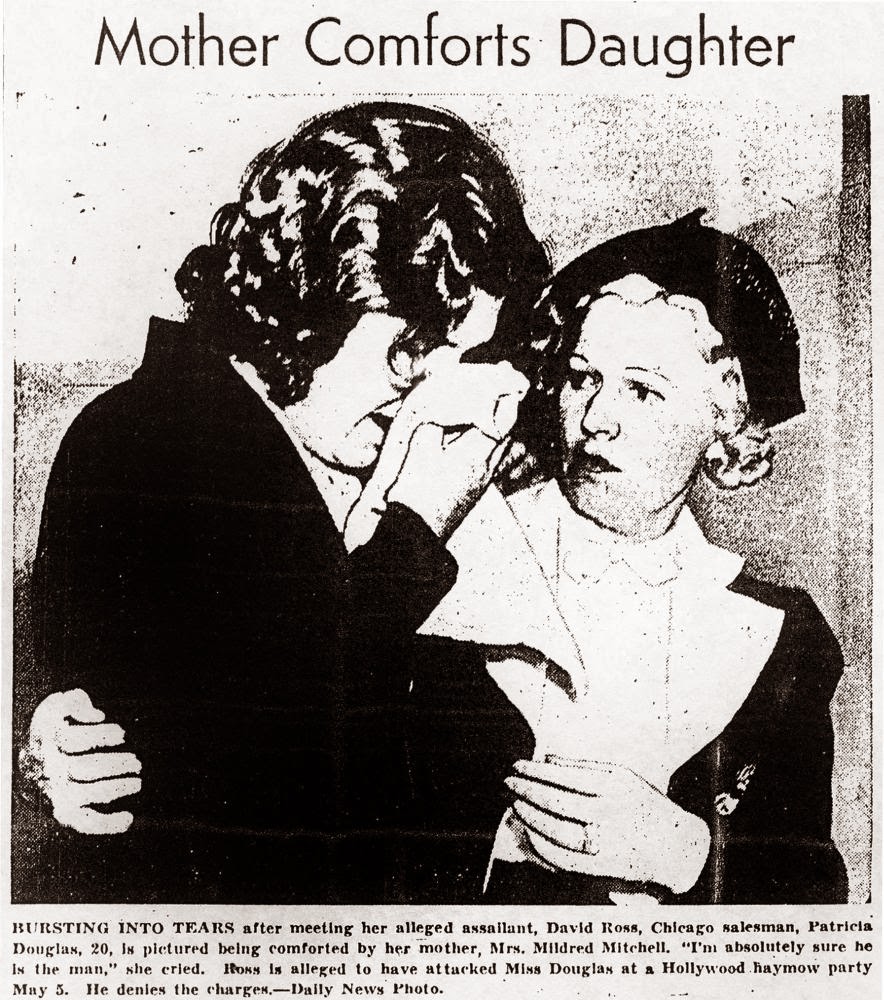 |
| Jodie Foster minutes before her attack in The Accused (1988) |
There's a film I like to show to most of my friends, it's a flawed documentary called Girl 27 (2007) about a rape case that was kept quiet by the Hollywood studios, mainly MGM for over 70 years. The story goes that in the early 30's a young teenager who worked as an extra for the studio was lured to the Hal Roach Ranch (a place where a lot of MGM films were shot) under false pretenses to be 'entertainment' for the MGM sales team, basically the people who sell the studio's films to theaters. Champagne and whiskey was flowing like ground water, and eventually this 17 year old named Patricia Douglas was dragged out into a parked car and brutally assaulted and raped by one of the salesmen, a man named David Ross. He was never served, never charged, and never had to pay for what he did. The studio heads snapped into action and made sure that even though Pat Douglas brought a class action law suit against him at the age of 17, they paid everyone including the only witness to the crime and even her own mother a substantial amount of hush money, and the whole thing stayed buried until a documentary filmmaker accidentally chanced on the headline while working on his book on Jean Harlow.
 |
| Pat Douglas and her mother outside the courtroom in a picture from the headlines in 1932. The mother was later paid to keep quiet about the whole thing. She took it and didn't ask any questions. |
It's been a long time since then but have things really changed? In the documentary, the victim, Pat Douglas brings up the 1988 film The Accused. In which Jodie Foster stars as a rape victim with Kelly McGillis as her attorney, who later came out in People magazine admitting she was raped. Jodie won the Academy Award that year, and everything seemed sealed up with a nice little bow. As if Hollywood was saying ok now we know the gravity of the issue and look, we addressed it so let it go away now. If only it was that easy.
There's a scene early on in The Accused where McGillis visits Foster and asks her about all of her 'bad habits'. As in, was she dressed provocatively, does she go to bars alone, and when she does does she get drunk? Even if she's had sex with multiple partners and when she does have sex if a man hits her does she enjoy it? Foster rightfully is unhinged by these terrifying questions and gets irate while McGillis explains herself saying that 'these are the questions they are going to ask you on the stand', to which Foster replies 'That ain't fair'. If that isn't the biggest understatement of our century.
 |
| 'That ain't fair'. |
No it isn't fair, and to this day that's what women have to endure. Just like what happened to Pat Douglas over 70 years ago, when they immediately labeled her a 'tart' and a 'tramp' because back then a tramp couldn't get raped. We see it happen again and again. It's what I like to call the 'double rape standard'. A woman gets attacked physically, and then she gets raped again on the witness stand when she is brave enough to fight for her dignity, her rights, and her life. In The Accused Foster is a self-described 'white trash bimbo' who works in a diner, drinks during the day, and goes to bars alone. And at first all of that is used against her even by her own lawyer. What hasn't changed at all is women being afraid of a predominately male-dominated world to speak out against injustice. In Girl 27, it was Pat's mother, in The Accused it's the best friend who actually witnesses what happens and once one of the male onlookers turns to her and says 'you're next' she runs off.
 |
| Pat Douglas in a Vanity Fair photo shoot when she finally revealed her story, about a year or so before she died. |
Since that film, this ugly subject matter has rarely been brought up because Hollywood daintily thought well we addressed it (because Foster does get her comeuppance in the end) and that's that. Let's close the book on that forever now. It's not that easy Hollywood. I bring up these two examples to illustrate how little has changed. And even though the outcome for Patricia Douglas was different than that for Jodie Foster's character, it's the hardship in between is something that continues to go unaddressed. In a world that is still highly dominated by the male perspective and male filmmakers, it's not going to be easy to get a woman's point of view, the exact point of view across. This is far from over, and until this stops happening basically every single day, we need to keep putting a mirror to it. Especially when we have (albeit inexplicable) public figures like Melissa Gorga from Real Housewives for New Jersey fame advocating marital rape in fucking 2014. It just goes to show that little has changed. It's never ok, and it's never the woman's fault. It's really not that hard folks. What I've been talking about is basically an archaic version of 'slut shaming' and we all know that that leads no where good. It's not ok either, and it's time to stop.
1 comment:
This my fav article of yours so far :D
Thanks for being awesome.
Post a Comment